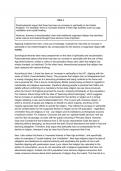Item J
Postmodernists argue that there has been an increase in spirituality in the United
Kingdom. For example, there is increased interest in New Age activities such as yoga,
meditation and crystal healing.
However, theories of secularisation claim that traditional organised religion has declined,
while science and rational thought have become more important.
Applying material from Item J and your knowledge, evaluate the view that an increase in
spirituality in the United Kingdom has compensated for the decline of organised religion (20
marks).
Sociological theories take many perspectives on the idea of spirituality and secularisation.
Postmodernists believe that there has been an increase in spirituality with the rise of New
Age belief systems, similar to critics of secularisation theory who claim that religion has
simply changed, not declined. On the other hand, interactionists propose that religion has
been replaced with rational thinking.
According to Item J, there has been an “increase in spirituality in the UK”, aligning with the
views of critics of secularisation theory. They propose that religion has not disappeared and
is merely changing form as it is becoming privatised and being confined to the home and
one’s personal life. This is due to contemporary British society being so liberal in regards to
individuality and religious expression, therefore allowing people to practise their faiths and
beliefs without conforming to a mandatory formal state religion (as was done previously
when the Church of England governed the country, imposing Christianity on the population).
For instance, Davie brings forth the idea of “believing without belonging”, which suggests
that an increase in spirituality has compensated for the decline in religion as it is simply
religion adopting a new, less fundamentalist form. This is seen with vicarious religion, in
which a minority of people are religious on behalf of a silent majority, and those in the
majority appreciate their efforts to uphold the religion. This reflects the increase in spirituality
and its compensation for the supposed decline in religion as the UK population - regardless
of whether they are religious or not - use religion and its institutions as therapeutic sources
of spiritual comfort. For instance, Churches are seen as “spiritual health services” and are
used for rites of passage, as seen with the public mourning of Princess Diana. However,
Voas and Crockett find that evidence from 5,750 survey respondents rivals the idea of
believing without belonging, as they found that both Church attendance and belief in God are
declining altogether. Therefore, they argue that spirituality has not compensated for the
decline in religion, whereas it may be clear from Davie’s argument that it has.
Item J also states that there is “increased interest in New Age activities”, and specifically
refers to examples of “crystal healing” and “meditation”. New Age religions reject the idea of
obligation and obedience to external authority and emphasise the growth of one’s self -
therefore aligning with postmodern views. Lyon claims that religion has relocated to the
sphere of consumption, as we do not associate with a religious organisation but have not
abandoned religion. Instead, the UK’s population have become religious consumers that
make conscious choices about which elements of religion they find useful. This has led to a




